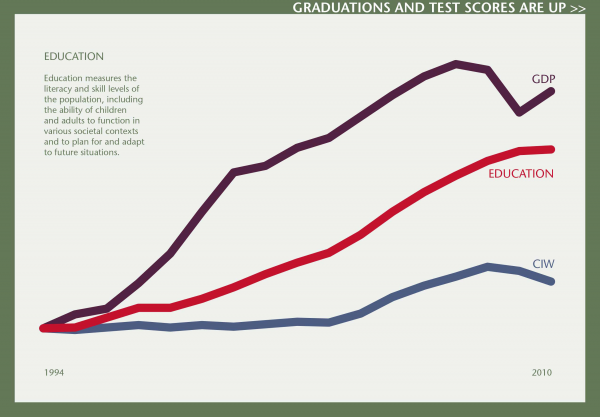
In life and societal affairs, “cumulative limits” can come into play. An ecosystem or a fishery, for example, can tolerate disruption in small doses, but persistent, cumulative disruption can do damage that is hard or impossible to reverse. Similarly, a given revenue base will only support expenditure in excess of revenue for so long before the cumulative debt can no longer be supported, economically or mathematically.
The notion of slower growth as a “new normal” seems to be one such case. We in the mature, developed world are reaping what we’ve sown. We’ve ignored our intergenerational stewardship obligations, destroyed critical balance sheets and are now in a long, painful healing process.
While there are plenty of explanations for how we got into this mess — regulatory failures, greedy bankers, ill-managed fiscal stimulus, real estate bubbles, fiscal mismanagement, monetary mismanagement and more — there is another common thread. Governments have largely abandoned the long term. The imperative for government to bridge the interests of generations has all but disappeared, aggravated by the complex, interconnected, high-speed globalized system we are now part of.
Technology has liberated information to the point where much of the world’s knowledge base is readily, if not instantly, available across most of the earth’s surface. People, countries, economies, geopolitical power and many of the institutions of civilized societies are going through change at breakneck speed on a massive scale. Nothing is untouched. Nothing is standing still. We are hopelessly unable to predict with any precision what lies ahead.
Businesses are seeing the new reality. They are seeing game-changing competitive pressures, and responding. They are embracing new approaches to management of global supply chains. They are taking new approaches to high-performance management through teams organized for agility and adaptability. Battle-ready balance sheets with little or no debt and plenty of cash are becoming the norm. Businesses are doing all this to create the resilience necessary to deal with life-threatening shocks and “black swan” events that are less predictable and more sudden than ever before.
Individuals are also reeling from balance sheets that looked adequate in an earlier era but are woefully inadequate for today’s contingencies. Faced with market-imposed realities, people are taking steps to repair personal balance sheets, adjust debt levels, modify education decisions or change retirement plans.

The big worry is government. Effective government is more important than ever in a fast-moving, interconnected global economy. But multilateral, rules-based arrangements are not keeping up with the pace of change. And interventionist government in so-called developing economies, like China, is injecting a new distortion to the global markets in which we compete.
Mature, democratic economies have been slow to adapt. More than ever we need trade and investment frameworks, critical infrastructure, education and training initiatives and technology and procurement initiatives, all requiring long lead times, planning horizons and management capability that is rigorous and agile. We also need government balance sheets that are strong and battle ready.
It is through such long-term anticipatory thinking that the interests of future generations become a core consideration.
Unfortunately, in a hyper-connected universe of social media swarms and viral communications, the focus of government has never been more immediate. News cycles, always top of mind in government, are shorter than ever. Short-term political calculations crowd out long-term considerations. The long term is the next election.
We see national and subnational governments accumulating debt for services consumed today, often rationalized as stimulus spending. But the bill will inevitably be passed to future generations that already face serious demographic challenges when it comes to financing the public sector.
Globalization has recently given resource-rich countries like Canada a tremendous edge in wealth creation, as developing countries seek out the industrial commodities and energy needed to transform and modernize their economies. Favourable terms of trade have meant favourable cash inflows.

In Canada the federal government is in better fiscal shape than most mature national governments, but provincial finances are in terrible shape. Witness the situation in Ontario, our largest province.
Even provinces with a rich bounty of natural resources are failing future generations as natural resource assets are monetized to pay for today’s public services. Alberta’s current consumption of public services, for example, is 20 to 30 percent paid for with nonrenewable resource revenues (energy). Meanwhile, the current generation enjoys the lowest tax levels and the highest public service levels in the country.
The opportunity for the benefits to be shared with future generations, who also have a claim on those resources, appears to have been squandered.
Alberta is not alone. Resource revenues are being consumed to cover current expenses across the country and are deeply embedded in permanent federal-provincial transfer payments such as equalization. Agreements to allow territories north of 60 to control their resources are now being developed by the Government of Canada. Let us hope an intergenerational imperative is embedded in those arrangements.
Yes, natural resources represent a vital, technologically advanced sector, offering an abundance of jobs for Canadians. But resource-dependent fiscal regimes are largely unsound, unstable and in some cases even morally flawed.
Why are Canadians so accepting of short-sighted approaches to public finance? After all, economically extractable resources, like carbon fuels, are a depleting asset that once gone is gone. They do not represent a permanent and stable source of revenue unless the proceeds are invested in ways that yield a permanent flow of income over the generations. But many of us cling to the belief that resource revenues are like taxes and will therefore never go away. So we allow our governments to take on permanent spending obligations paid for by selling a publicly owned asset and treating the proceeds like ongoing revenue.
The knock on Canada’s resource dependence is less about so-called Dutch Disease and the dislocation caused by a higher exchange rate, and more about a deeper curse. Our resource bounty has broken down the essential linkage between government spending and taxation that is at the heart of accountable democracy. We have pretended the income statement and the balance sheet are basically interchangeable. We sell assets and call the proceeds income.
Being truly honest with ourselves, the government is us, and we are rather enjoying the government services we don’t have to pay for.
It is too lenient to say we are living in a fool’s paradise, because it suggests we will eventually have to pay the piper. More likely we are living in a real paradise that we will force our kids to pay for. And an aging demographic will require them to pay even more to make up for the declining portion of the population that is working.
The new normal is simply the marketplace telling us it’s time to clean up the mess. Perhaps the markets don’t believe the kids can actually pay the bills we are poised to leave behind.
Photo: iStock







